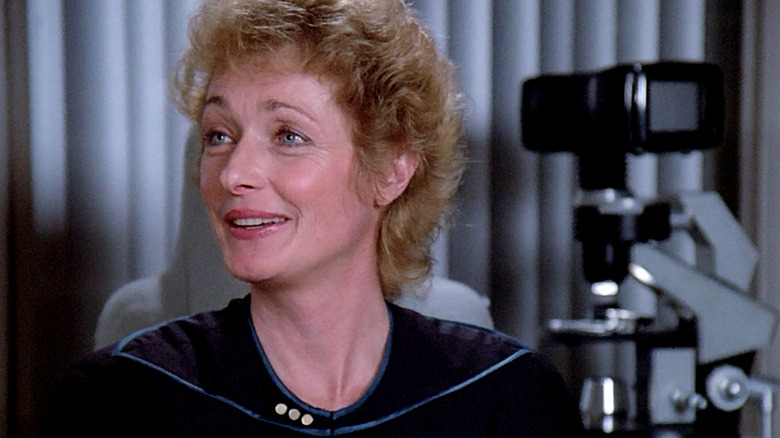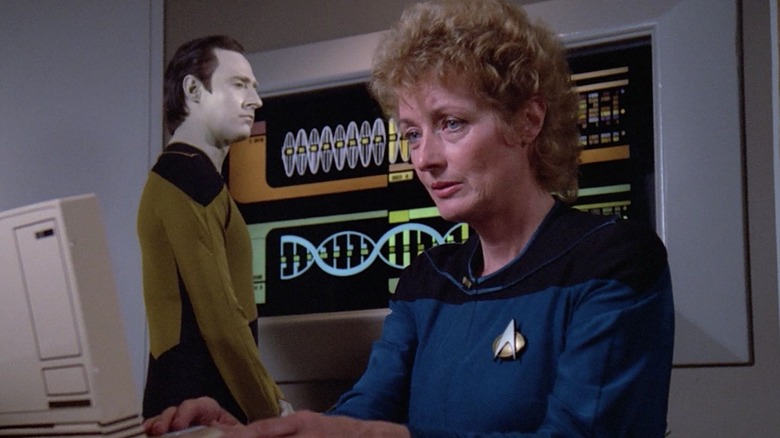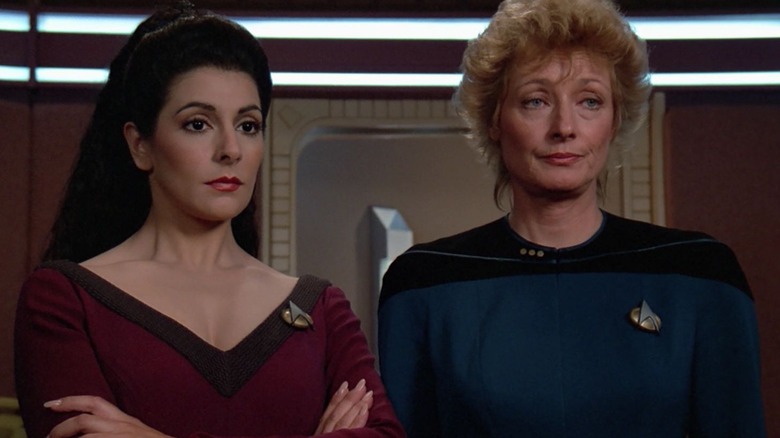Why One Of Star Trek's Most Hated Characters Is Better Than You Remember
At the end of the first season of "Star Trek: The Next Generation," actress Gates McFadden, who played Chief Medical Officer Dr. Beverly Crusher on the U.S.S. Enterprise, was infamously fired from the show. The story goes that one of the show's producers, a guy named Maurice Hurley, didn't like McFadden, and the two butted heads on set often. When Hurley became the showrunner, he fired McFadden, hoping to replace her with a new character that long-term Trekkies might be more familiar with.
In came Dr. Pulaski, played by "Star Trek" veteran Diana Muldaur. Dr. Pulaski was a more brusque, less matronly character than Dr. Crusher, and spoke to Captain Picard (Patrick Stewart) in a pointedly unprofessional manner. She was, as Trekkies spotted right away, meant to resemble Dr. McCoy (DeForest Kelley) from the original "Star Trek" series. Trekkies are sharp, and we sensed right away that we were being pandered to. Even at the time — 1988 — some "Star Trek" fans referred to Dr. Pulaski as McCoy, Jr.
The character was resented instantly, and no one really liked her. This wasn't Muldaur's fault, of course. We liked her. It was her character we hated. Furthermore, she gained some instant animosity in her first episode, "The Child," when she openly disrespected Data (Brent Spiner) by refusing to pronounce his name correctly. This was meant, some suspected, to recreate the contentious relationship that McCoy had with Spock (Leonard Nimoy) on the original series, but to "Next Generation" fans, it merely read as rude. Pulaski was closed-minded and grumpy, a cliché and a throwback. To this day, she's considered a tertiary "Trek" character.
But a re-watch of "Next Generation" proves that there was a lot more growth and nuance to Pulaski than we Trekkies may have initially given her credit for. Indeed, by the end of the season, Pulaski had become more open-minded and warm. She even became friends with Data.
Dr. Pulaski had more character growth than she gets credit for
But, wow, that first one-on-one that Pulaski had with Data sure stuck in people's throats. Pulaski and Data are in the lab investigating a medical mystery when she refers to him as "Data" with a short "a." Data corrects her. It is pronounced with a long "a." What's the difference, she asks. "One is my name," Data says. "The other is not." Pulaski could have said that she would pronounce it correctly moving forward. Instead, she is astonished that Data would be offended ... and immediately begins scanning him with a tricorder. She wonders if she hurt his feelings, but in an objective, scientific way. She assumed that he was a mere machine, and didn't warrant respect. For fans who already loved Data, this scene rubbed us all the wrong way.
And indeed, Pulaski underestimates Data several more times. In the episode "Where Silence Has Lease," Pulaski asks Data to perform a task as a bridge officer: she wants him to increase the magnification on the viewscreen. When nothing seems to happen, Pulaski turns to Picard and asks, "It does know how to do these things, doesn't it?" in reference to Data. She refers to him as a "device."
But here's the thing: Pulaski did grow over time. She initially stood apart from the crew, unable to make friends, but by the end of the second season of "Next Generation," she actually did start to form relationships. Like any character on a long-running show, her relationships to the other characters only needed a little time to develop. The softening of Dr. Pulaski was gradual; her "hard-nosed" qualities became less and less pronounced. She was still mildly crotchety, but started to fit in. At least kind of.
Dr. Pulaski eventually became a part of the crew
By the events of "Peak Performance," Dr. Pulaski found herself in a position to console Data. The android had lost a strategy game called Stratagema, something that he thought his android brain was incapable of doing. The loss gave Data an existential crisis, wherein he assumed he was malfunctioning. Pulaski attempted to explain that losses were to be expected every now and again. She was doing something friendly. Finally, she was treating Data like an equal. She was a grump, but if she had stayed, Pulaski's grumpiness clearly would have given way to a team player.
Producer Maurice Hurley was fired as the showrunner on "Next Generation" at the end of its second season, which allowed the new showrunners to re-hire Gates McFadden immediately. It's not that Pulaski was awful, but most everyone preferred McFadden's character of Dr. Crusher more. Also, Diana Muldaur was never terribly passionate about Dr. Pulaski, saying in an interview with StarTrek.com that she never intended to stay longer than one year. Muldaur said she had a lovely time, but didn't want to stay, eager to move on to other acting projects. She never met Gates McFadden, and didn't really develop warm relationships with her co-stars. It was no trial to leave "Star Trek."
When McFadden returned, many Trekkies breathed a sigh of relief, happy to have their preferred character and actress back in place. McFadden continued to play Dr. Crusher for the rest of the series, and into the movies and reboots, all the way up to 2023. McFadden's performance made Pulaski seem like an aberration, and many Trekkies were happy to move on. But perhaps we should pause again to consider Dr. Pulaski as a more well-rounded character than she was initially presented as. She wasn't eternally prejudiced against Data, and was eager to learn. And that, of course, is very much in the spirit of "Star Trek."


